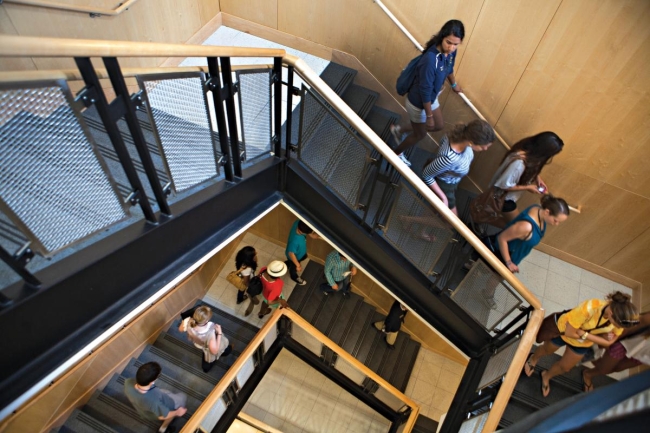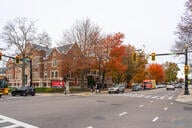You have /5 articles left.
Sign up for a free account or log in.

Students who arrive at college as undeclared majors are getting more help with picking a course of study. Many universities are changing how they view and support those students.
The Washington Post/Getty Images
University of Nebraska at Omaha students who enrolled without declaring a major or don't want to pursue the course of study they initially chose are no longer referred to as “undecided” students with “undeclared majors.” Thanks to a relatively new program at the university, they also no longer occupy a gray area of academia — students taking courses with no defined plan of study and no direct pathway to a degree.
The university’s Exploratory Studies program, now in its second year, offers these students a more formalized and supported opportunity to figure out what they want to study. The program also aims to raise their retention and graduation rates in the process.
The program goes beyond the occasional academic advising and counseling many institutions typically offer such students and instead provides them with an “academic home,” said Tammie Kennedy, director of the Exploratory Studies program. The program includes a mandatory course in exploratory studies, full-time faculty who also serve as mentors, small classes and adviser-to-student ratios, and peer mentoring by students who’ve already gone through the program.
Administrators of the program say such targeted efforts will well serve students who enrolled without a clear vision of their desired course of study and those who flounder and eventually leave college without earning a degree.
Part of the process is viewing and treating these students differently, Kennedy said. Referring to them as “undecided” or “undeclared” at times created a negative perception of them among the academic community. Those terms also influenced students’ perception of themselves.
“We take away that title of ‘undecided.’ They have decided—to go to college. They’re now ‘explorers,’” Kennedy said. “Changing that name was for the benefit of the students, giving us an identity and making not having a major a positive thing.”
The program is available to students for three semesters, and the mandatory course emphasizes “happiness” as a crucial factor in choosing a major, said Kim Cassisa, the program coordinator. It helps students consider different majors and career options and introduces them “to interdisciplinary ways of viewing your life.”
The program even provides emergency funds to students at risk of dropping out for financial reasons.
“We want to provide a matrix of support for them to find that best-fit major,” Kennedy said.
Although the program is only in its second year, administrators have ambitious plans to expand it. Their ultimate goal is to increase the graduation rate of student participants from its current 8 percent to 20 percent. According to figures provided by the university, re-enrollment by Exploratory Studies students rose 4 percent in fall 2021 after one year in the program. What’s more, 87 percent of 152 students surveyed during the spring semester that ended last month reported they had chosen a major or were getting close to choosing one, and 86 percent said they felt confident that they would graduate.
Between 800 and 1,000 students—first-time incoming students, transfer students and students who changed their minds about their declared majors—enter the program each year, Kennedy said. Many of them are first-generation or low-income students or both, she added. The challenge those students often face getting accustomed to college is compounded by the fact that many came in with very little or no understanding of what they wanted to do once they got into college.
The concept of reimagining the instruction of undecided students goes back nearly three decades. North Carolina State University’s Exploratory Studies program began with the creation of First-Year College, an initiative to assist students without declared majors. Purdue University started a program in 1996 that now serves around 1,000 first-year students with undeclared majors. The principles of the various programs are essentially the same—give students guidance and academic supports to help them keep their grades up and help them find a major that fits their interests and professional goals.
Linda Gregory, executive director of Purdue’s Exploratory Studies program, said students are encouraged to examine “What do you want your future to look like? What do you value, how do you want to work, where do you want to work?”
Purdue’s program also includes a three-credit first-year course, access to academic advisers and a low student-to-adviser ratio. It’s a four-semester program, but Gregory said students often declare a majors by the second or third semester.
Like her counterparts at other institutions, Gregory believes the change in terminology about such students is important. She said the “stigma” of being called “undeclared” or “undecided” is real and goes back even to the last year of high school for many students.
“This is a gateway; this is not a back door” to attending Purdue, Gregory said of the program.
According to figures provided by Purdue, the retention rate of first-year students in the program was 87.5 percent for the 2020–21 academic year, and the four-year graduation rate for admitted students who selected the program before enrolling was 57.5 percent compared to 65 percent for the university over all. The six-year graduation rate for program participants was 77.4 percent compared to 83 percent over all.
Gregory said she has spoken with administrators who either are starting such programs, who have recently started them and want to expand them, or who are considering starting them.
“Many of them have the right intentions and want to provide the services,” she said, adding that such programs instead serve as “a temporary place” for students who were not admitted to their preferred program or course of study within the university.
Kennedy noted that she has seen other universities the same size or larger than the University of Nebraska at Omaha introduce exploratory studies programs to upgrade their services to undecided students, but those programs were limited in scope.
“You can get some extra help; you have advisers available to you,” she said. But those other programs don’t have faculty members from other departments teaching exploratory studies classes. Faculty members in her program are trained in mentoring and make themselves available to students far more often than a handful of times per semester, as many other programs do. The faculty members also train the peer mentors to essentially serve as teaching assistants, she said.
Kennedy said the program is now more streamlined than it was in the first year, after administrators determined that students did better with just faculty and peer advisers helping them rather than various separate advisers.
“I think in year two, we’ve kind of found our sweet spot,” she said. “In our first year, we were kind of guessing. We were building it from scratch. It’s actually starting to solidify.”




